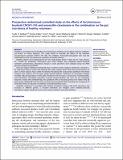| dc.contributor.author | Kabbani, Toufic A. | en_US |
| dc.contributor.author | Pallav, Kumar | en_US |
| dc.contributor.author | Dowd, Scot E. | en_US |
| dc.contributor.author | Villafuerte-Galvez, Javier | en_US |
| dc.contributor.author | Vanga, Rohini R. | en_US |
| dc.contributor.author | Castillo, Natalia E. | en_US |
| dc.contributor.author | Hansen, Joshua | en_US |
| dc.contributor.author | Dennis, Melinda | en_US |
| dc.contributor.author | Leffler, Daniel A. | en_US |
| dc.contributor.author | Kelly, Ciarán P. | en_US |
| dc.date.accessioned | 2017-04-06T03:19:10Z | |
| dc.date.issued | 2017 | en_US |
| dc.identifier.citation | Kabbani, Toufic A., Kumar Pallav, Scot E. Dowd, Javier Villafuerte-Galvez, Rohini R. Vanga, Natalia E. Castillo, Joshua Hansen, Melinda Dennis, Daniel A. Leffler, and Ciarán P. Kelly. 2017. “Prospective randomized controlled study on the effects of Saccharomyces boulardii CNCM I-745 and amoxicillin-clavulanate or the combination on the gut microbiota of healthy volunteers.” Gut Microbes 8 (1): 17-32. doi:10.1080/19490976.2016.1267890. http://dx.doi.org/10.1080/19490976.2016.1267890. | en |
| dc.identifier.issn | | en |
| dc.identifier.uri | http://nrs.harvard.edu/urn-3:HUL.InstRepos:32072043 | |
| dc.description.abstract | ABSTRACT Probiotics are believed to be beneficial in maintaining a healthy gut microbiota whereas antibiotics are known to induce dysbiosis. This study aimed to examine the effects of the probiotic Saccharomyces boulardii CNCM I-745 (SB), the antibiotic Amoxicillin-Clavulanate (AC) and the combination on the microbiota and symptoms of healthy humans. Healthy subjects were randomized to one of 4 study groups: SB for 14 days, AC for 7 days, SB plus AC, Control (no treatment). Participants gave stool samples and completed gastro-intestinal symptom questionnaires. Microbiota changes in stool specimens were analyzed using 16s rRNA gene pyrosequencing (bTEFAP). Only one subject withdrew prematurely due to adverse events. Subjects treated by S boulardii + AC had fewer adverse events and tolerated the study regimen better than those receiving the AC alone. Control subjects had a stable microbiota throughout the study period. Significant microbiota changes were noted in the AC alone group during antibiotic treatment. AC associated changes included reduced prevalence of the genus Roseburia and increases in Escherichia, Parabacteroides, and Enterobacter. Microbiota alterations reverted toward baseline, but were not yet completely restored 2 weeks after antibiotherapy. No significant shifts in bacterial genera were noted in the SB alone group. Adding SB to AC led to less pronounced microbiota shifts including less overgrowth of Escherichia and to a reduction in antibiotic-associated diarrhea scores. Antibiotic treatment is associated with marked microbiota changes with both reductions and increases in different genera. S. boulardii treatment can mitigate some antibiotic-induced microbiota changes (dysbiosis) and can also reduce antibiotic-associated diarrhea. | en |
| dc.language.iso | en_US | en |
| dc.publisher | Taylor & Francis | en |
| dc.relation.isversionof | doi:10.1080/19490976.2016.1267890 | en |
| dc.relation.hasversion | http://www.ncbi.nlm.nih.gov/pmc/articles/PMC5341914/pdf/ | en |
| dash.license | LAA | en_US |
| dc.subject | adult | en |
| dc.subject | antibiotic | en |
| dc.subject | antibiotic-associated diarrhea | en |
| dc.subject | healthy | en |
| dc.subject | microbiota | en |
| dc.subject | probiotic | en |
| dc.subject | | en |
| dc.title | Prospective randomized controlled study on the effects of Saccharomyces boulardii CNCM I-745 and amoxicillin-clavulanate or the combination on the gut microbiota of healthy volunteers | en |
| dc.type | Journal Article | en_US |
| dc.description.version | Version of Record | en |
| dc.relation.journal | Gut Microbes | en |
| dash.depositing.author | Leffler, Daniel A. | en_US |
| dc.date.available | 2017-04-06T03:19:10Z | |
| dc.identifier.doi | 10.1080/19490976.2016.1267890 | * |
| dash.contributor.affiliated | Leffler, Daniel | |
| dash.contributor.affiliated | Kelly, Ciaran | |


